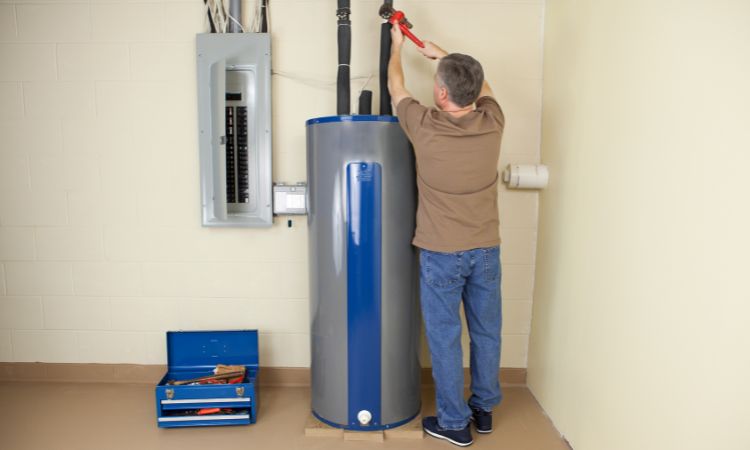A Step-By-Step Guide For Standard Heater Issues
A Step-By-Step Guide For Standard Heater Issues
Blog Article
Just about every person maintains their own unique piece of advice in relation to Water Heaters Problems.

Picture beginning your day without your routine warm shower. That currently sets an inadequate tone for the rest of your day.
Every house requires a reliable hot water heater, yet only a few understand exactly how to take care of one. One very easy way to maintain your hot water heater in top shape is to check for mistakes on a regular basis and also repair them as quickly as they show up.
Bear in mind to switch off your hot water heater prior to smelling about for mistakes. These are the water heater faults you are most likely to encounter.
Water also warm or as well cold
Every hot water heater has a thermostat that establishes just how warm the water obtains. If the water entering into your house is as well hot in spite of establishing a hassle-free maximum temperature level, your thermostat could be defective.
On the other hand, as well cold water might result from a fallen short thermostat, a busted circuit, or incorrect gas circulation. For example, if you use a gas hot water heater with a busted pilot light, you would certainly get cold water, even if the thermostat is in best problem. For electric heating units, a blown fuse might be the culprit.
Inadequate warm water
Hot water heater can be found in many sizes, depending upon your hot water demands. If you run out of warm water before everybody has had a bath, your water heater is as well small for your family size. You should consider setting up a larger hot water heater storage tank or choosing a tankless water heater, which takes up much less area and is extra sturdy.
Odd noises
There go to least five sort of sounds you can speak with a hot water heater, however one of the most common analysis is that it's time for the water heater to retire.
First off, you must know with the normal seems a hot water heater makes. An electrical heater may appear different from a gas-powered one.
Popping or banging sounds generally indicate there is a slab of sediment in your containers, and it's time to cleanse it out. On the other hand, whistling or hissing audios may simply be your shutoffs allowing some pressure off.
Water leakages
Leakages could originate from pipes, water links, shutoffs, or in the worst-case situation, the tank itself. Gradually, water will corrode the storage tank, and discover its escape. If this occurs, you need to replace your hot water heater as soon as possible.
Nonetheless, prior to your modification your entire container, be sure that all pipes remain in place and that each shutoff functions perfectly. If you still need assistance recognizing a leakage, call your plumber.
Rust-colored water
Rust-colored water means one of your hot water heater parts is worn away. Maybe the anode pole, or the container itself. Your plumber will certainly be able to recognize which it is.
Warm water
Despite how high you established the thermostat, you won't get any type of warm water out of a heating system well past its prime. A hot water heater's efficiency may minimize with time.
You will certainly additionally obtain warm water if your pipes have a cross connection. This suggests that when you turn on a faucet, warm water from the heater flows in along with regular, cold water. A cross connection is easy to place. If your warm water taps still run after closing the hot water heater valves, you have a cross link.
Discoloured Water
Rust is a significant source of dirty or discoloured water. Corrosion within the water container or a falling short anode rod could trigger this discolouration. The anode pole protects the tank from rusting on the inside as well as must be examined annual. Without a pole or a properly functioning anode rod, the hot water quickly corrodes inside the tank. Contact a professional hot water heater technician to determine if changing the anode pole will repair the problem; otherwise, replace your water heater.
Verdict
Ideally, your hot water heater can last 10 years prior to you need a change. Nevertheless, after the 10-year mark, you may experience any of these mistakes extra routinely. At this point, you ought to add a new water heater to your budget.
How To Troubleshoot 3 Common Water Heater Problems in Twin Cities
The Water Heater Is Leaking
A leaky cold water inlet valve A loose pipe fitting A leaky temperature and pressure relief valve A corroded anode rod A cracked tank Turn Off Your Water Heater:
Shut off your gas water heater by turning the gas valve on the unit to the “OFF” position. Shut off your electric water by switching its power off at your electrical panel. Look for a two-pole breaker labeled “water heater” and turn it to the “OFF” position. Move the ball valve connected to the water heater to be perpendicular to the piping at a 90° angle. Look for the Leak:
Depending on whether the water is coming from the tank's top or bottom, you’ll want to look for the leak in different locations.
If the leak comes from the top of the tank, carefully look for water escaping from the cold water inlet valve or loose pipe fittings. Rusted hot and cold water valves can have loose connections with the tank, with water leaking out of them.
https://mspplumbingheatingair.com/blog/how-to-troubleshoot-3-common-water-heater-problems
We had been introduced to that write-up about Water Heater Repair and Troubleshooting through an associate on another site. Be sure to set aside a second to share this content if you liked it. Bless you for your time. Kindly pay a visit to our site back soon.
Save time, call now! Report this page